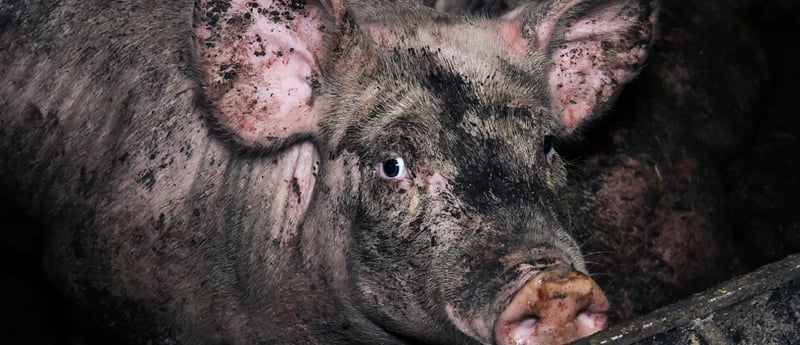
Factory Farming: The True Cost of Our Reliance on Meat, Eggs, and Dairy Products
Press release
First-of-its-kind research exposes the true global scale of factory farming and its detrimental effects on farmed animals, human health, and the environment.
London, UK - 25 November 2025 - Factory farming is reducing the lifespan of people and animals and creating irreversible damage to our environment, according to new research from charity, World Animal Protection.
Very little research currently exists on the multiple effects of the immense global factory farming industry. The Factory Farming Index (FFI) is the first attempt to calculate the widespread harm caused by this food system.
In 2020, the production of factory-farmed animals reached 76 billion worldwide, with 46% of chickens, pigs, and cows farmed in just four countries: China, Brazil, the USA, and Indonesia. The highest consuming countries, on average per person, includes Israel, Panama, Belarus, and Qatar. The highest per capita consuming countries include Israel, Panama, Belarus, and Qatar, with an estimated ten animals consumed per person annually.
The FFI calculates that factory farming of chickens, pigs, and cows for eggs, meat and dairy causes 1.8 years of healthy life to be lost per person on average globally. The main causes of this are:
- Antibiotic resistance: 66,000 tonnes of antibiotics are used on factory-farmed chickens, pigs, and cows. This is double the amount used for humans. These antibiotics are used to prevent disease in crowded, unsanitary conditions. While they can be used to treat sick animals, they are also frequently given to healthy animals to compensate for the stress and disease risks associated with intensive farming practices.
- Pulmonary disease: due to the large volume of animal excreta factory farms emit ammonia, nitrous oxide and fine particulate matter which have been linked to a range of pulmonary health conditions, especially in people living or working near these facilities.
- Excess meat consumption: particularly red and processed meat is linked to colorectal cancer, heart disease, type 2 diabetes, stroke, kidney disease, and possibly dementia.
This means that even if you don’t consume factory farmed animal products, the system is likely reducing your lifespan through the antibiotic resistance and particulate emissions it causes.
Factory farming also has an increasingly large environmental impact. It:
- Is a major contributor to greenhouse gas emissions, with the global agrifood system responsible for approximately 29.7% of total emissions.
- Causes around 25% of total human-caused water pollution, related to excess nitrogen and phosphorus.
- Uses 14% of all human freshwater withdrawals (530 trillion litres each year).
- Uses cropland the size of India (350 million hectares), mostly to grow animal feed.
Beyond the major human health and environmental costs, there is immense animal suffering and incredibly short animal lifespan, which has become normalised and hidden from view in factory farming systems.
- We estimate that globally, farmed chickens live for just 5% of their potential lifespan, and pigs live for just 4%. This drops to 1.3% (as little as 35 days) and 3% (160 days) in the USA.
- Cows live for a longer portion of their potential lifespan due to dairy production, where productive lives are longer.
- 74% of factory farmed animals are produced in countries where there is no legislation on slaughter or slaughter without stunning is permitted.
Improving animal welfare can strengthen a country’s performance in the FFI, but the only lasting solution is to move away from factory farming and shift toward an equitable, humane, and sustainable food system. This means making plant-based foods a larger part of our diets while supporting small-scale producers who prioritise care for animals and the land, ensuring that any remaining animal farming meets the highest standards for welfare, environmental protection, and human health.
Tricia Croasdell, CEO of World Animal Protection, said: "We need to support countries in looking to the future of how they feed their populations without damaging human health, animals, and our planet.
"This research is clear: in order to achieve a better quality of life for people, we need a better quality of life for animals. This ultimately means prioritising plant- based diets, ending factory farming, and reducing the environmental impact that we are all facing if we don’t act.
ENDS
Notes to Editors
- A full copy of the research can be downloaded here
- For an interview please contact Angela Stevenson angelastevenson@worldanimalprotection.org
About World Animal Protection
World Animal Protection is a global organisation working to end animal exploitation. We expose cruel systems, promote animal-friendly alternatives, and influence policy change. For 75 years, we’ve been rewriting the story for animals.
Working across almost 50 countries with offices in 12, we are the only global animal advocacy organisation with general consultative status with the UN Economic and Social Council (ECOSOC) and all its subsidiary bodies. This enables us to engage with and influence global decision-makers. We prioritise animals in farming and wild animals exploited for use in entertainment, as pets, and in fashion.